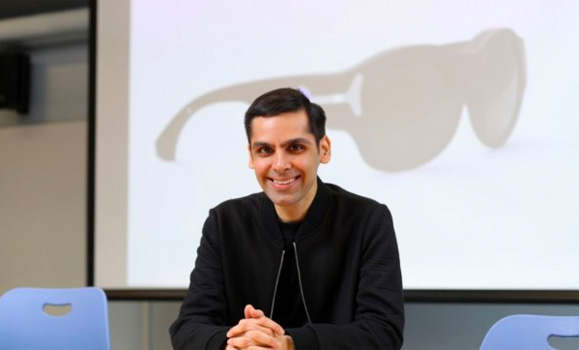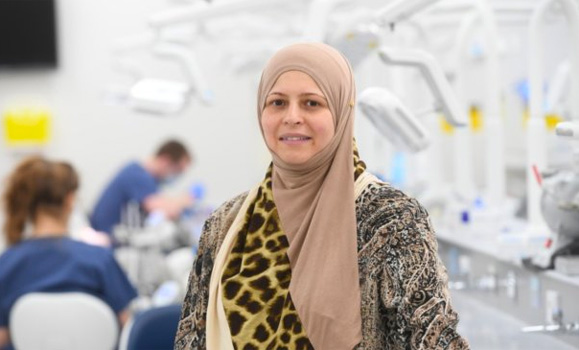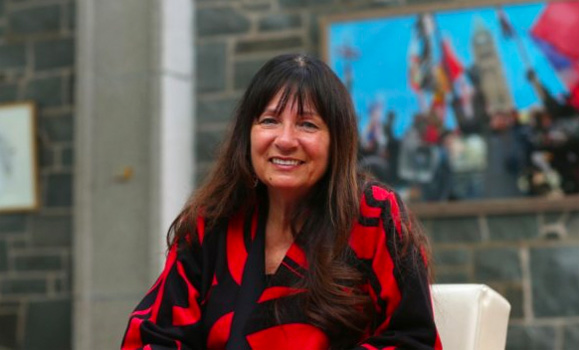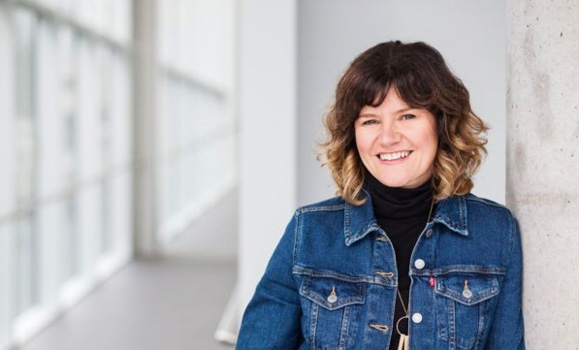Dalhousie has always been proud to celebrate its outstanding alumni — and is doing so this year with a brand new set of awards.
They're called the Aurum Awards — Latin for "gold." They recognize innovators and visionaries who are making a difference in their communities and around the world. The awards build on the outstanding achievements and legacy of past Dalhousie Alumni Award winners, and while the name may be different, the essence is the same: honouring Dalhousie alumni for their achievements and celebrating their ideas, knowledge and talent that helps to shape a better world.
The first set of Aurum Awards will be presented Friday night, May 31, at a reception at the Lord Nelson Hotel in Halifax as part of Dal Alumni Days. Learn more about the four outstanding recipients below.
Anirudh Koul (BCS’07)

Anirudh Koul recalls the moment his grandfather could no longer recognize him during one of his weekly video calls to his family in New Delhi.
“It was heartbreaking to see how his vision was declining,” says Koul, who was a senior data scientist at Microsoft at the time. “I started looking for solutions that could help him but was shocked to see the state of assistive technology. It felt decades old. So when you can’t find a solution, you do the next best thing. You go build it yourself.”
Drawing on his computer science education, Koul, along with his team, developed Seeing AI, a talking smartphone app that helps people who are blind or low vision get descriptions of the world around them. It was an instant success when released by Microsoft in 2017, quickly becoming the defacto app used by the blind community worldwide. And the feedback from users encouraged Koul to look at other ways to use artificial intelligence to enhance accessibility and ability for everyone.
“It’s something I had been thinking about for years,” Koul says. “We often think people who have mobility issues, low vision, or hearing loss are disabled and I believe that’s wrong. Disability is merely a mismatch between a person and the environment they are in. Armed with the right tools to fill that gap, people are limitless. And the challenge here is coming up with the right tools. Luckily, incorporating artificial intelligence presents a great opportunity for making those tools.”
Koul is tapping into the potential of this technology, with groundbreaking work that has been recognized by FCC Chairman’s Awards for Advancement in Accessibility as well as the American Council of the Blind.
In addition to Seeing AI, Koul, working with a group of like-minded employees, helped develop several other accessibility-related projects during his six years at Microsoft. They include Hearing AI, which visualizes sound, speech & makes phone calls for people with profound hearing loss, and Dictate, which enables hands-free typing (now included by default in Microsoft Office). In 2018, he joined the company Aira, which provides people who are blind or low vision with instant access to real-time visual information from a team of trained agents. As its Head of Artificial Intelligence and Research, his team is enhancing the technology that makes this information available whenever and wherever users need it.
“What Aira has made possible is incredible,” Koul says. “I’m hearing from people who have done things they never imagined doing, from running a marathon, painting the Eiffel Tower, taking photographs, to even driving a lap around a racetrack. Just knowing what a life-changer this technology has been for them is why I do what I do.” Aira was recently named as one of the best inventions of 2018 by TIME Magazine, and Koul has been invited to showcase it at the United Nations.
There is much more Koul plans to do. He would like to develop an AI-based virtual guide dog. He wants to help reduce the unemployment rate in the blind community from 70 percent to 7 percent. But more than that, he hopes that the work he is doing will encourage others to look at what they can do to help make a difference.
“The more people I can encourage to pursue this mission in their own ways, the quicker we can make dreams come true,” Koul says.
Sura Hadad (BSc'98, DDS’03)

If anyone can help make people smile, it is Sura Hadad. She has proven that not just through her popular dental Halifax practice but also by giving back to communities home and abroad with her time and effort.
Whoever needs help, I just go for it,” says Dr. Hadad. “It could be one person, or it could be many. I don’t have any criteria. If there is someone out there in need, I’m there.”
That is no understatement. Since immigrating to Canada from Iraq in 1991, Dr. Hadad has demonstrated a level of community involvement that truly exemplifies the spirit of going above and beyond. She has provided free dental at her clinic to Syrian refugees, who are new to Canada, and seeking oral care. She frequently donates toothbrushes and sandwiches she makes with her family to shelters throughout the Halifax Regional Municipality.
She and her family are also sponsoring a family in her home country. And in 2018, Dr. Hadad and her daughter went to Kenya to help build a dormitory for a girls’ college as volunteers with One Woman, a Halifax-based global social enterprise dedicated to helping women and girls reach their full potential.
“My family lived through a lot of hard times, especially when I was growing up, and ultimately we were forced to leave Iraq,” Dr. Hadad recalls. “We had many challenges to re-establish our lives. I always thought if I ever had the opportunity, I was going to try and support those that have gone through struggles like I did. Now I can make a difference, and it is a heart-warming feeling.”
Dr. Hadad’s spirit of generosity also extends to Dalhousie, manifesting itself both in a gift to the university’s ambitious Dental Clinic Renewal Project, which was completed last fall, and the establishment of a scholarship for second-year students in the Doctor of Dental Surgery Qualifying Program, who want to relocate to Canada and practice.
“Dalhousie gave me valuable education and skills, so I wanted to give back to ensure more students receive the same quality of education as I did while rewarding their hard work and dedication.”
In line with this commitment, Dr. Hadad is looking at other opportunities to get involved. She would like to travel more to help refugees around the world, maybe even establish a free dental clinic to serve those in need. But more than that, she wants to continue to inspire others to follow her lead, not just students and fellow alumni, but also her children.
“When you can encourage people to step up, that’s when you know you are really making a difference, and it is particularly rewarding because you know the work you are doing will have a domino effect.”
Heather McNeill (LLB’94)

When most people retire, they take up a hobby, or travel the world. Not Heather McNeill (LLB’94). Since winding down a 21-year career as a Dalhousie Legal Aid lawyer, McNeill has been, as she puts it, “working full time plus-plus” as Legal Advisor of the Enhanced Child Family Initiative at the Mi’kmaq Rights Initiative Negotiation Office, and with several community initiatives and organizations. And it is clear she wouldn’t have it any other way.
“I believe the Creator has put me on the earth to serve and I get great pleasure out of that,” McNeill says. “Sometimes, I’m helping in small ways. Sometimes, it’s something bigger. But anything I can do to help make this world better, I will do.”
Inspired by the example set by her mother, who always extended herself to help those in need, McNeill continues to exemplify true Weldon Tradition in her devotion to making a difference, particularly for First Nations communities in Nova Scotia. The Millbrook Band member is a board member with Tawaak Housing, which is helping Aboriginal peoples in securing affordable shelter off the reserve.
She is a member of the Indigenous Blacks & Mi’kmaq Initiative Advisory Council and the IB&M Standing Committee at the Schulich School of Law. She is also putting her Dalhousie background to good use with the Truth and Reconciliation Commission working group at the Nova Scotia Barrister’s Society and, perhaps most notably, with the Mi’kmaq Rights Initiative, supporting Mi’kmaq efforts to develop a governance model for Mi’kmaq child welfare in Nova Scotia.
“This is profound,” McNeill says. “The way the current child welfare system operates does not work for Mi’kmaq communities because it does not always keep our children in our communities, so they maintain their sense of culture, identity, and language. It is the intent of the Mi’kmaq to have full jurisdiction over these matters and that will enable us to look at ways to better support our Mi’kmaq families, caregivers, and children to make that happen.”
For her, recognition like an Aurum Award is an opportunity to inspire others.
“I have always believed you lead by example,” she says. “When people see or know that you are doing what is right or what is needed, they might follow in your footsteps. That’s what’s important to me – to see others pick up that thread.”
For that reason, McNeill is not quite ready to fully embrace retirement just yet. She wants a more equitable society – one where First Nations youth are encouraged and supported in getting the learning they need to succeed in any career they want.
“We should be everywhere,” McNeill says. “We should be educated and part of not only Nova Scotia’s fabric but also Canada’s. That is happening. I look at these young, energetic superstars and I feel optimistic about my people’s future.”
Megan Leslie (LLB’04)

When Megan Leslie was 15, she and her friends staged a protest to convince politicians in Kirkland Lake, ON, to vote against a proposal that would create jobs by filling her community’s empty mine shafts with toxic waste.
“The town council decided not to go ahead with it,” Leslie says. “I don’t think we actually influenced their decision, but it was my first experience where I felt I could help shape my community, and I wanted to do more of that.”
More than 30 years later, Leslie has stayed true to that decision in ways that have not only shaped her life but also our society and the world. As a Dalhousie law student, she embraced the Weldon Tradition through her work on behalf of low-income families through the university’s Legal Aid Service. As a New Democrat Party member representing Halifax in parliament, she introduced a bill to ban microbeads and seconded a bill to expand Canada’s Human Rights Act to protect the transgender community. And now as president and CEO of World Wildlife Fund Canada (WWF-Canada), she is focused on restoring vital habitat and reversing the decline of wildlife species nationwide.
“My goal has always been to work on issues of justice,” Leslie says. “For me, that means environmental, social, and economic justice. I want to see more equity. I want to see rights being upheld. I want to see a clean environment. I’m very mission driven.”
Leslie’s current mission is the development of a strategic plan for WWF-Canada to address the main drivers of wildlife loss, including climate change and industrial activity such as mining. It follows on a significant victory for the organization – the federal government’s announcement it will ban oil drilling and mining in marine protected areas. Leslie says she is happy to have played a role in making this momentous decision possible. Reflecting on what it takes to attain those wins, Leslie brings it back to her successful motion in Parliament to ban plastic microbeads.
“When I look at any achievement like that, I have a keen awareness that it is not about me. I was just the right voice at the right time to help bring an idea forward, or I held a unique position that enabled me to make something happen. But I could not have done any of the things I have done without legions of other people being involved in these efforts.”
For that reason, Leslie is dedicated to creating opportunities for more people to be engaged and make a difference wherever possible. She is looking to include more indigenous perspectives and knowledge in the WWF’s efforts to preserve our wildlife and making time to encourage more women to seek political office.
“I hope, through my work, I’m helping to create a movement of future leaders,” Leslie says. “In thirty years, when I am retired and sitting on my porch, I want to look out there and see thousands of Canadians mobilizing and inspiring each other to seek justice in many different ways.”
Comments
comments powered by Disqus

